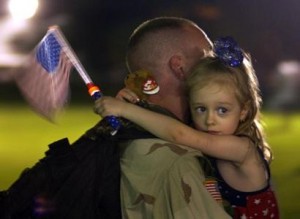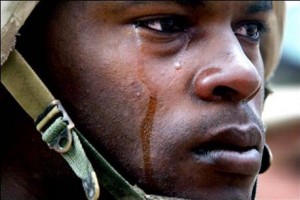Coming Home in the 21st Century
Pathologizing War, Prioritizing Peace
by Michael N. Nagler
The recent British film, In Our Name, is a returning-soldier drama featuring a married woman, Suzy, who leaves her husband and little girl to fight in Iraq.  Because she’s involved in the killing of a little girl during her tour (this part is based on a true story, but it happened to a man) she returns home only to steadily fall apart under the stress of soul-destroying anxieties. Apparently not much has changed since Coming Home, the Jane Fonda film of 1978.
Because she’s involved in the killing of a little girl during her tour (this part is based on a true story, but it happened to a man) she returns home only to steadily fall apart under the stress of soul-destroying anxieties. Apparently not much has changed since Coming Home, the Jane Fonda film of 1978.
In real life, Ethan McCord was involved in a now-infamous episode that took a strangely similar turn. It became one of the most shocking (and hopefully awakening) revelations by Wikileaks: the video now dubbed “Collateral Murder†that was taken from an Apache helicopter as its gunners massacred a group of civilians in a Baghdad suburb in 2007. Addressing a Southern California audience about his role in the episode this past June, McCord described how he saw two small children mangled by gunfire from the helicopter and thought of his own two children at home.
McCord, though he is understandably tense, does not seem to be completely unnerved by the trauma. Instead, it forced him to wake up from the lies that had put him in a uniform to kill other people’s children halfway across the globe, and he took it upon himself to try waking up others. Among people who have lost loved ones to gun violence — like, for example, Azim Khamisa, who now works to dissuade school children from joining gangs after his son was mindlessly killed by one — some have discovered that turning grief and guilt to reconstructive work can be psychologically restorative. But their number is not legion. Many, many more have gone, and are now going, the way of Suzy from In Our Name. According to a covered-up story that is about to be released by Project Censored, a Northern California-based media watchdog service, the number of active-duty soldiers or veterans who have committed suicide has just surpassed the number of those killed in combat.
We are facing a social problem of massive proportions, as our already-grim experience with returning veterans from Vietnam should have warned us. Psychologist Rachel McNair developed the concept of Perpetration Induced Traumatic Stress (PITS) to bring home to us the fact — now dramatically supported by neuroscientists — that you cannot send people out to kill and maim without expecting them to suffer enduring torments themselves, no matter how thoroughly you try to desensitize them beforehand. Thank God! Where would we be if this capacity to respond to the joys and sufferings of others could really be squelched?
There have been admirable attempts to get needed help to these spiritually wounded men and women; but the real answer, the only sane and compassionate answer, is prevention. And that means only one thing: to stop glorifying violence in our social culture and national policy — in other words, renounce war. It won’t be easy. Colonel Harry Holloway, a U.S. Army psychiatrist, told journalist Dan Baum recently, “As soon as we ask the question of how killing affects soldiers, we acknowledge we’re causing harm, and that raises the question of whether the good we’re accomplishing is worth the harm we’re causing … if we get into this business of talking about killing people we’re going to pathologize an absolutely necessary experience.â€
But what is the alternative? Those children who opened Ethan McCord’s eyes were killed by a machine in the sky a mile and a half away with 30mm cannon rounds — ordinance tipped with depleted uranium and meant for penetrating armor, not tearing apart human beings. If truth is the first victim in war, humanity is a close second. Thus, if we do not “pathologize†what is truly sick, we end up pathologizing what isn’t: peace. (Remember the “Vietnam syndrome?â€) If we do not fear our own bestiality we end up producing a climate that, as none other than General Douglas Macarthur said, “renders among our political leaders almost a greater fear of peace than is their fear of war.â€
Perhaps those who still believe that war is an “absolutely necessary experience†would reflect with us on the following story. It was Poland, in 1942. The Gestapo was raiding the apartment of the Kshenskys, who had participated in the Jewish underground. Finding the “incriminating†evidence, they were about to take the  mother, who was home alone with their two-year-old son, out to the courtyard and shoot her when she saw, with horror, that her toddler was playing with the shiny buttons on the Gestapo captain’s uniform. He, too, noticed, and stared down at the child. After what must have seemed an eternity he looked up, his face totally changed, and said,“I have a son at home just his age, and I miss him very much.†Then he added, “Your son has saved your life,†and ordered his men out of the apartment. The child did not survive the war, but the Kshenskys miraculously did; their daughter, Lili Kshensky Baxter, is a former Chair of the National Council of the U.S. Fellowship of Reconciliation.
mother, who was home alone with their two-year-old son, out to the courtyard and shoot her when she saw, with horror, that her toddler was playing with the shiny buttons on the Gestapo captain’s uniform. He, too, noticed, and stared down at the child. After what must have seemed an eternity he looked up, his face totally changed, and said,“I have a son at home just his age, and I miss him very much.†Then he added, “Your son has saved your life,†and ordered his men out of the apartment. The child did not survive the war, but the Kshenskys miraculously did; their daughter, Lili Kshensky Baxter, is a former Chair of the National Council of the U.S. Fellowship of Reconciliation.
There is a way out of this dehumanizing dilemma, and that is to rise up and say, “No!†War is not a necessary evil, nor indispensable activity. It is a horror and a travesty on human nature. We have international courts now; we have nonviolent intervention teams. There is, as there has always been, the possibility of conversation among civilized people — provided we elect them. And there are the arts of nonviolence, of which a Kurdish gentleman in Kirkuk said recently, “It may be slow, but you don’t lose your humanity.†Journalist Marshall Frady has given a beautiful description of how this kind of struggle not only preserves, instead of surrendering, our humanity but makes it into a spreading force:
In the catharsis of a live confrontation with wrong, … an oppressor can be vitally touched, and even, at least momentarily, reborn as a human being, while the society witnessing such a confrontation will be quickened in conscience toward compassion and justice.
Michael N. Nagler, Ph.D., is Professor emeritus of Classics and Comparative Literature at the University of California, Berkeley where he co-founded the Peace and Conflict Studies Program. He is the founder of the Metta Center for Nonviolence, serves as co-Chair of the Peace and Justice Studies Association, and is a Contributing Author for New Clear Vision. Among his many publications in the field of nonviolence, Dr. Nagler is the author of The Search for a Nonviolent Future: A Promise of Peace for Ourselves, Our Families, and Our World (New World Library), winner of the 2002 American Book Award.

There is overwhelming evidence that many children are killed, injured,
traumatised by war. Obviously, it is more disturbing if you
witness the deaths of the children. But whether you see or not does alter the horror of your actions.
What continues to puzzle me is that humans persist in violence. Even when the enemy is no particular threat, they remain a target. Even when we know that all conflicts are resolved by negotiation, dialogue, talk not bullets, we continue to ruin people’s lives with bullets and bombs. So the real issue is… how can we work with governments, voters and the military, to persuade them that violence is pointless. Part of my life was spent during the American/Soviet disputes. We lived in fear of an atomic war. It appeared that the Soviets spent their efforts bankrupting themselves in preparation of the inevitable conflict. However it was impressive to see the results of cooperation and the development of space travel, and the final abandonement of ideological conflict. Why cant we talk to each other? why cant we care and share?
go to http://www.kelvynrichards.com A Discourse: Social Ecology…….chapter on Conflict.
1